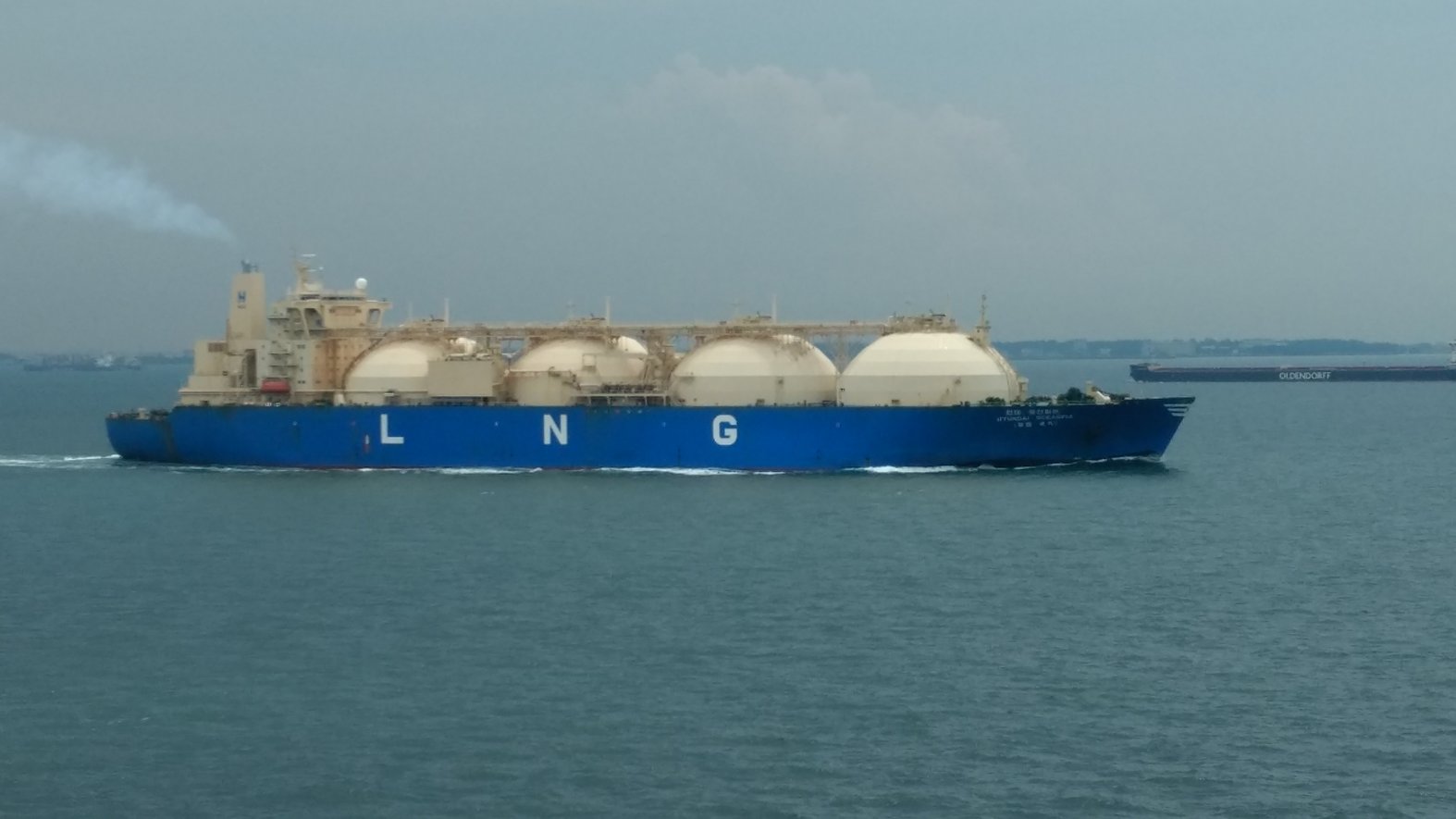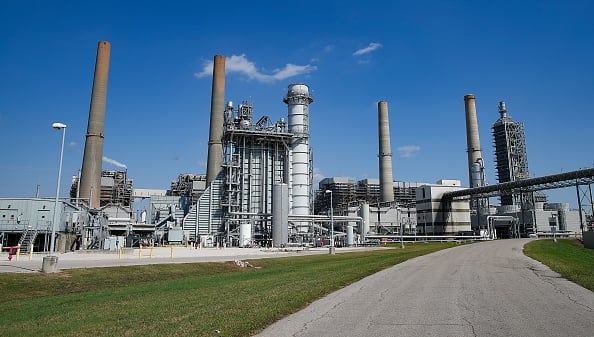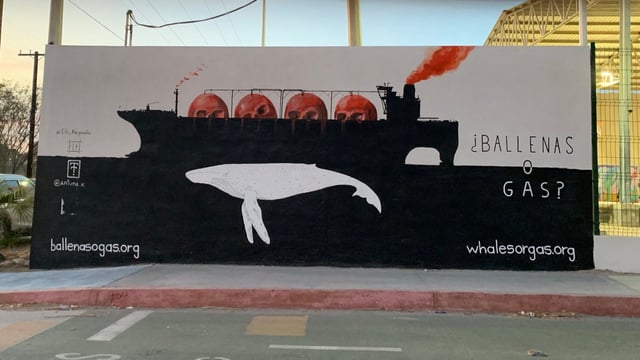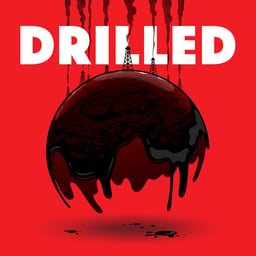
Photo credit: Martian-2008, CC BY-SA 4.0 via Wikimedia Commons.
This story was published in partnership with The Guardian and supported by The Pulitzer Center
Earlier this month, the Republican Governors Public Policy Committee sent a letter to President Biden, blaming rising gas prices on his administration’s energy policies and calling on him to back an industry wishlist that includes repealing air pollution standards, increasing oil and gas leasing, and lifting the temporary pause on permits for new LNG export terminals. The group also hosted a press conference at a refinery in Louisiana, calling on Biden to “unleash American energy!” Theatrics aside, the Biden administration—which has overseen record levels of oil and gas production—is not the LNG industry’s biggest problem, Europe is.
Two weeks before that presser in Louisiana, EU officials announced the finalization of a measure that the gas industry has been fighting for more than a year: a time limit for long-term gas contracts. Only those that can show they are “abating” the emissions associated with their product can get around this ban, leaving producers with a new challenge: convincing the world that liquefied natural gas, a fossil fuel, is actually a climate solution.
It’s just the latest battle for the methane gas industry, which has struggled with profitability throughout its existence. Winning the fight in 2015 to lift the United States’ decades-old ban on crude oil exports was a lifeline to American shale drillers. Then the pandemic knocked them for a loop and oil majors like Exxon and Chevron took the opportunity to swoop up assets and acquire smaller players. In 2022, gas was back on top: it took industry lobbyists just about a month to turn Putin’s invasion of Ukraine into a boon for gas exports in the form of a U.S.-European Commission commitment to replace Russian gas with American LNG.
But to chart a path out of their endless boom-and-bust cycle, U.S. LNG companies need more; namely larger, longer contracts. And while it lost the fight against contract limits, the industry did manage to secure one meaningful loophole. The EU’s gas market reforms specify that “long-term contracts for unabated fossil gas [emphasis mine] should not last beyond 2049.” It also emphasizes a shift to “low-carbon gas,” which is how producers have been positioning LNG.
Leading much of the effort to convince overseas customers that U.S. LNG is uniquely environmentally friendly is an industry group called the Partnership to Address Global Emissions, which launched in October 2022, just a few weeks before the annual UN climate summit in Egypt. Social media posts, lobbying disclosures, and documents obtained via public information requests show that since its launch, PAGE has been advocating for the U.S. LNG industry in Europe. The group’s name sounds vaguely climate-friendly but its members—EQT, Enbridge, Williams, and TC Energy—are some of North America’s largest methane gas companies, and its goal is clear: While other industry groups tend to pit affordability and national security against climate concerns, PAGE promotes LNG as a win-win climate solution.
PAGE argues that LNG is an important climate solution and that increasing its production will both tackle global emissions and make the U.S. and its allies more secure. But environmental, energy and economic experts not affiliated with PAGE or its members say that, contrary to the group’s claims, increasing U.S. LNG exports would exacerbate climate change, make the U.S. and its European allies less secure, and drive energy prices up for U.S. consumers and businesses.
PAGE’s lobbying has leaned on an idea EQT had previously been pushing on its own: that U.S. producers can supply the EU with “the cleanest LNG” and that replacing “foreign” coal with U.S. LNG reduces emissions by 40 to 50 percent. According to data from Meta and Media Radar PAGE has run more than 100 Facebook ads as well as a sponsored event with Axios and a Politico advertorial since its launch, promoting these ideas.
The PAGE Coalition also touts the “lower carbon” profile of methane gas. In its public-facing materials, PAGE often paints the picture that LNG is only ever replacing coal. The group rarely mentions the fuel’s planet-warming methane emissions, or the fact that methane gas emits 22 percent of the world’s CO2 emissions. Methane is a shorter-lived gas than carbon dioxide, but it’s also a more intense greenhouse gas, warming the atmosphere up to 80 times more than CO2, and delivering about 30 percent of global warming since the Industrial Revolution.
Nonetheless, PAGE and its members have built an ecosystem of validators that support the idea that LNG is a climate solution. The management consulting firm McKinsey provided research support for EQT’s report “Unleashing U.S. LNG: The Largest Green Initiative on the Planet,” for example. McKinsey also supported EQT and its president and CEO Toby Rice at COP 28 in Dubai. Stanford Doerr School of Sustainability professor (and former Chevron staffer) Naomi Boness sits on the PAGE Coalition advisory council and regularly pushes the environmental benefits of LNG. The think tank The Progressive Policy Institute (PPI) has also been a longtime supporter of the idea that LNG is the fastest way to reduce carbon emissions. Paul Bledsoe, the former strategic advisor of PPI and author of most of PPI’s white papers and op-eds in support of LNG as a climate solution, has since left the organization, but now sits on the PAGE Coalition advisory council and is a widely-quoted supportive source on LNG exports in the media.
“It is grossly misleading to state that U.S. LNG would be good for the climate,” Dr. Niklas Höhne, founder of the NewClimate Institute, and professor at Wageningen University in the Netherlands, told Drilled via email. The full lifecycle emissions of LNG include the very energy-intensive process of liquefying gas, as well as shipping it, and Höhne said that makes LNG’s emissions far greater than those associated with burning the gas alone, “making it as emissions-intensive as coal.” That claim has also been made in recent months by Cornell University researcher Robert Howarth.
“U.S. LNG mostly increases gas demand and only in rare cases replaces coal,” Höhne added. “LNG infrastructure locks in LNG use for decades competing with emissions-free renewables and therefore increasing emissions.”
Toby Rice, the CEO of EQT, is the most public and vocal spokesperson for the idea that “unleashing American LNG” (the title of the McKinsey-researched EQT presentation) is a silver bullet climate solution. Rice has claimed that EQT produces the “cleanest” methane gas in the country. According to Rice, EQT “created PAGE,” although Christopher Treanor, a lobbyist for D.C.-based firm Akin Gump Strauss Hauer & Feld—which has a long list of oil and gas clientele, including EQT—also takes credit for creating the group, and serves as PAGE’s executive director.
PAGE Goes to Europe
The organization began requesting meetings with European politicians in 2023, via its PR firm Fleishman Hillard. In May 2023, Courtney Loper, head of government relations and public affairs for EQT, had a video conference with EU Energy Commission staff on behalf of PAGE. Minutes from that meeting show that PAGE Coalition members asked for the Commission’s help to “increase infrastructure” for LNG in Europe. The stated purpose of the meeting was to “take stock of EU-US cooperation and possibility of further cooperation with greater LNG volumes.”
While the Commission told PAGE representatives it could not get involved in specific projects, staffers said the Commission does “work on providing a wider supportive policy context” and said that they were in “constant dialogue” with the U.S. Departments of Energy and State. On June 1, 2023, EU Commission Director-General for Energy Ditte Juul Jørgensen also had a video conference with PAGE, and later that month, Toby Rice and other members of the PAGE Coalition met with EU Energy Commissioner Kadri Simson and members of her staff in person in Brussels.
Since the meetings with PAGE, Simson has repeatedly talked about the benefits of moving away from Russian gas and of strengthening cooperation with the U.S. on LNG. And in September 2023, three months after her meeting with PAGE, Director-General Jørgensen, told the FT that US LNG would be needed in Europe for decades. The FT called it “one of the strongest signals from Brussels that EU states will consume US LNG well past the end of the decade.”
“The US has been a key ally and partner in our energy supply diversification efforts over the past two years, and has become our main LNG supplier,” EU Commission for Energy spokesperson Giulia Bedini told Drilled via email. Bedini said that in 2021, the United States exported 20 bcm of LNG to Europe, a figure that rose to 56 bcm in 2023, “which is even more than the 50 bcm agreed for 2030.”
“Securing LNG and piped gas imports of non-Russian origin from a range of reliable partners has been a key component of our general efforts to diversify supply and make our energy system more resilient,” she added. “This diversification of supplies goes hand-in-hand with an accelerated deployment of renewable energy within the EU, and energy efficiency improvements and energy savings.”
That commitment to energy efficiency and renewables has already driven down Europe’s need for U.S. LNG, according to energy analysts. At the current rate of buildout, “the combined capacity of Europe’s LNG terminals could be three times higher than its expected LNG demand by the end of the decade,” Ana Maria Jaller-Makarewicz, lead energy analyst on the European team for the Institute for Energy Economics and Financial Analysis, wrote in a recent report. In an interview with Drilled, she explained that EU policies had resulted in gas consumption declining from 2021 to 2023, while renewables increased. “Energy efficiency has played a part in it as well as weather and demand destruction,” she said. The EU’s LNG imports didn’t increase nearly as much in 2023 as was initially expected, rising by only 5 percent year over year, after an increase of 66 percent from 2021 to 2022. Those reductions trail a 20 percent reduction in EU demand for gas from 2021 to 2023. “If this trend continues, the EU will need less LNG in 2030 than it does today,” Jaller-Makarewicz said.
While EU countries’ LNG imports only increased 5 percent from 2022 and 2023, and demand decreased, the buildout of EU LNG import infrastructure increased by 13 percent.
Impact on U.S. Prices
It’s not just PAGE’s claims that LNG is necessary for Europe and good for the climate that critics question, but also the group’s assertion that increasing U.S. LNG exports is good for American energy consumers.
Paul Cicio, President and CEO of Industrial Energy Consumers of America, a trade group representing energy-intensive manufacturers, says the rapid increase in LNG exports has meant skyrocketing prices and volatility that puts American manufacturing at a disadvantage. He says the long-term contracts U.S. LNG exporters have inked with Europe “increase security for other countries and decrease security for U.S. consumers. They reduce both our economic stability and our national security,” he said.
Meanwhile, a report out earlier this year from the Institute for Energy Economics and Financial Analysis declared increased LNG exports bad for U.S. residential energy consumers, too, connecting exports to a 9 percent price increase from 2016 to 2023.
Although permitting for new LNG export terminals is temporarily paused, already-approved permits from the Trump and Biden administrations account for an increase in the volume of U.S. LNG exports over the next five years from 13 billion cubic feet per day to 48 billion cubic feet per day, with a doubling of export capacity expected by 2026. While the PAGE Coalition says that increasing LNG exports will keep prices low, Cicio says that’s not what we’ve seen historically. “As LNG export terminals increase their volume, what that does is increase the LNG export peak in winter every year on top of the domestic demand peak,” he said, which tends to send prices higher, not lower.
Like most other oil and gas industry group, the PAGE Coalition has been advocating for an early end to the Biden administration’s LNG pause. It is joined in this effort by its sister group, Natural Allies for a Clean Energy Future, which includes EQT, Enbridge, Williams, and TC Energy as funding members. Four Democratic politicians—former Senator Mary Landrieu (D-LA), former Congressman Tim Ryan (D-OH), former Congressman Kendrick Meek (D-FL) and former Philadelphia Mayor Michael Nutter—serve on its “Leadership Council”. Where PAGE seems to be largely focused on shoring up European support for North American LNG exports, Natural Allies has been aggressively marketing the idea that expanding LNG will deliver well-paid blue-collar jobs, keep energy prices low for American consumers, and support the transition to renewables. Both groups have spent the past two years leveraging Russia’s invasion of Ukraine to garner support for increasing the production and export of U.S. LNG. In a statement about the pause on export terminal permits, Natural Allies’ leadership council wrote: “Any reduction or delay in exporting natural gas will jeopardize American jobs and force countries, particularly in Europe, to choose between coal or Russian energy.”
In January 2024, a spokesperson for the European Commission told S&P Global that the pause would “not have any short- or medium-term impact on the EU's security of supply.”
PAGE Coalition ally The Progressive Policy Institute has focused on the potential climate impacts of the pause, warning that it will lead to increased coal use. The group suggested that rather than curbing LNG exports, if the Biden administration is concerned about climate change it should prioritize “certified low-methane gas,” also sometimes referred to as “differentiated gas.” Prior to the launch of the PAGE Coalition, its members had independently been pushing the idea of “differentiated gas” as well.
In May 2022, EQT CEO Toby Rice met with U.S. Special Presidential Coordinator for Global Infrastructure and Energy Security Amos Hochstein, for example, to discuss “expanding LNG exports to Europe and building capacity to replace overseas coal with cleaner, more reliable U.S. LNG,” according to Hochstein’s agenda, which was released in response to a lawsuit filed by Friends of the Earth.
The meeting was secured by Treanor, who described EQT in his meeting requests as having “played an integral role in keeping the methane fee alive during BBB negotiations,” and being ready to lead on the issue of methane emissions. “EQT plans to show that the U.S. industry can replace overseas coal and the world's leakiest gas—Russian—while reducing both carbon and methane emissions. Essentially, we have no choice but to differentiate parties and practices within the industry, which is always difficult to message, and will be very unpopular with many in the industry,” he wrote in April 2022. Six months later, PAGE, which notably does not include U.S. oil majors, was launched to take the same message Treanor and Rice emphasized to Hochstein in their bid to increase U.S. export capacity across the Atlantic to European officials.
By early 2023, the State Department and the Department of Energy were also working on a framework for “differentiated gas” that echoed Treanor and Rice’s proposal. Both agencies eventually backed away from the idea after environmental and government accountability groups urged them to reconsider, but the DOE did launch a non-regulatory “best practices” framework for methane emissions measurement, monitoring, reporting and verification, and the agency is working with its counterparts in the European Commission to establish an international framework. According to the industry group The Differentiated Gas Coordinating Council, this effort “is intended to address gaps and promote consistency across emissions reporting platforms in order to provide market participants with comparable and reliable information about GHG emissions and intensity.”
Accurate monitoring of methane emissions has historically been a problem both for LNG producers and for early certification programs, like Project Canary. A new report from EarthWorks and Oil Change International found that EQT partner Project Canary’s monitors were consistently failing to detect emissions, for example, which opens up a lot of questions about what certification really accomplishes, or whether the idea of “differentiated gas,” or claims like EQT’s, that it “has a methane intensity 1/10th of the rest of the industry,” as PAGE lobbyist Treanor wrote to Hochstein in 2022, have any basis in reality. According to the International Energy Agency, oil and gas companies’ actual methane emissions are about 95 percent higher than what they report.

During CERA Week in March 2024, multiple panel discussions focused on the continued growth of LNG and its role in a “low-carbon world.” On the sidelines of the event, Treanor told the trade publication Hart Energy that the PAGE Coalition had “been spending a lot of time over the last year and a half educating folks, including in Europe, in Southeast Asia and elsewhere about the opportunities to replace coal with U.S. LNG.”
Meanwhile, after an unseasonably warm winter in Europe, continued decreases in demand there, and the EU’s new embrace of contract limits, Rice is re-focusing on other markets, too. Rice and EQT want to quadruple U.S. LNG capacity—as EQT is expanding its own fracking operations. In August 2023, EQT announced it had bought Appalachian fracking company Tug Hill and distributor XcL Midstream in deals worth billions, and in March 2024, EQT acquired the controversial Mountain Valley Pipeline project. Rice spent much of April and May talking to the press about how the energy demands of the artificial intelligence boom will be a boon for shale gas. Meanwhile, PAGE isn’t giving up on Europe just yet. Treanor was there again in May to “meet with European leaders to discuss the role of US LNG in strengthening cross-Atlantic ties on climate change and energy security.”
Estacio Valoi also contributed reporting to this story.





